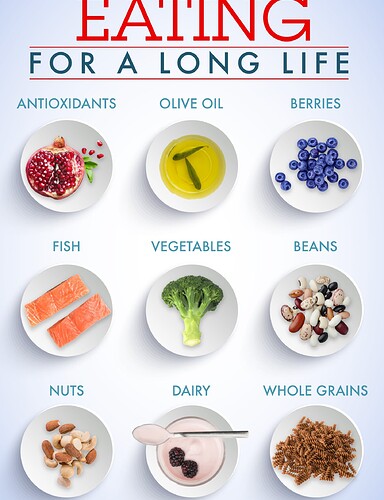As a foodie, you may be wondering what types of foods can help you live a longer and healthier life. While there’s no single food that can guarantee longevity, incorporating certain foods into your diet can provide important nutrients and help reduce the risk of chronic diseases. Here are some top foods to consider:
- Leafy Greens
Leafy greens (learn how to select the best…) such as spinach, kale, collard greens, and Swiss chard are packed with nutrients that are essential for good health. These greens are high in antioxidants, vitamins, and minerals, which can help reduce inflammation and prevent damage to cells. Eating leafy greens regularly may also help lower the risk of heart disease and some types of cancer.
To incorporate more leafy greens into your diet, try adding them to salads, soups, or smoothies. You can also sauté them with garlic and olive oil for a delicious side dish. Here are some cool recipes for Cooked Leafy Greens.
- Berries
Berries such as blueberries, strawberries, raspberries, and blackberries are not only delicious, but they are also high in antioxidants that can help fight inflammation and protect against cellular damage. These little fruits are also rich in fiber and vitamins, which can help reduce the risk of chronic diseases such as heart disease and diabetes.
You can enjoy berries on their own as a healthy snack, or add them to oatmeal, yogurt, or smoothies for a delicious and nutritious breakfast. Try this Berry Frozen Yogurt Recipe or our Lemon Berry Mix-Up Freezer Jam recipe.
- Nuts
Nuts like almonds, walnuts, and cashews are a great source of healthy fats, protein, and fiber. They also contain vitamins and minerals that are important for good health, such as vitamin E and magnesium. Eating nuts regularly may help lower the risk of heart disease and improve cholesterol levels.
To incorporate more nuts into your diet, try sprinkling them on salads, oatmeal, or yogurt. Here’s a cool Salad with Pine Nuts and Feta Cheese. You can also enjoy them as a snack on their own or in a homemade trail mix.
- Fish
Fatty fish such as salmon, sardines, and mackerel are high in omega-3 fatty acids, which are essential for brain health and can help reduce the risk of heart disease. These fish are also a good source of protein and other important nutrients. We have many salmon recipes and even a Sardine Salad for you to try.
To incorporate more fish into your diet, try grilling or baking it with some herbs and spices. You can also add canned fish like salmon to salads or pasta dishes for a quick and easy meal.
- Whole Grains
Whole grains like brown rice, quinoa, and oats are a great source of fiber, vitamins, and minerals that can help reduce the risk of chronic diseases such as heart disease, diabetes, and certain types of cancer. Whole grains also provide long-lasting energy and can help you feel full and satisfied.
To incorporate more whole grains into your diet, try replacing refined grains like white bread and pasta with whole grain options. You can also add whole grains to salads, soups or even pancakes for a nutritious and filling meal.
- Legumes
Legumes such as beans, lentils, and chickpeas are a great source of protein, fiber, and important nutrients like iron and magnesium. Eating legumes regularly can help lower cholesterol levels and reduce the risk of chronic diseases such as heart disease and diabetes.
To incorporate more legumes into your diet, try adding them to soups, stews, or salads. You can also enjoy them as a side dish or as a vegetarian main course. Get started with some easy bean recipes.
- Fermented Foods
Fermented foods like yogurt, kefir, and kimchi contain beneficial bacteria that can improve gut health and boost the immune system. These foods also provide important nutrients like protein and calcium.
To incorporate more fermented foods into your diet, try adding yogurt or kefir to smoothies like this Raspberry Frozen Yogurt.
Enjoy!
Until Next Time… Be Well!
RSN
